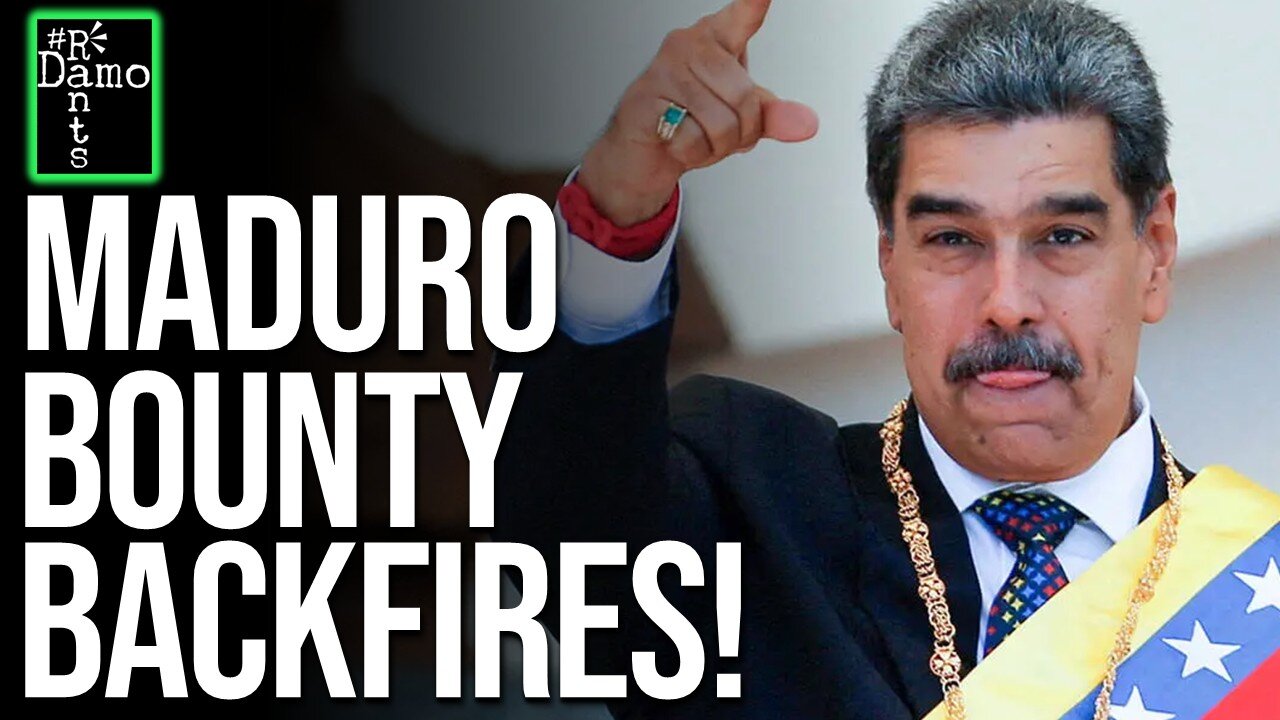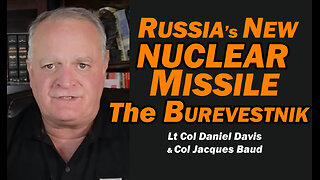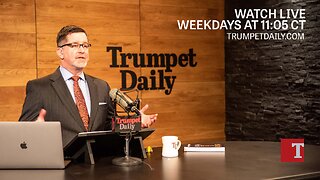Premium Only Content

Trump Compares Maduro to Bin Laden — And It's Backfired Hilariously!
Right, so Donald Trump has always been a man who likes to put a price on things — skyscrapers, loyalty, golf memberships, the truth. In line with all of that, he put a price on a president: fifty million dollars for the capture of Nicolás Maduro, the socialist leader of Venezuela. The official line, trumpeted by the Justice Department and amplified by all the susual sycophantic and sympathetic outlets, was that this was about law, order, and saving American lives from a “narco-terrorist.” But if Trump thought this was going to be a one-way auction, Caracas had other ideas. Within hours, Venezuela matched his bid it seems — not for a man, but for the unreleased Jeffrey Epstein files, the very trove of secrets Trump had promised to release on the campaign trail and has been desperately playing down for weeks, because he’s almost certainly in them himself. In one move, Maduro’s government flipped the narrative from an international manhunt to a global bidding war for credibility.
It was a counter-punch with teeth. The US desperately wants the world to see Maduro as a fugitive from justice and the main reason for that is oil; Venezuela invited the world to see Trump as the gatekeeper of a scandal involving a convicted sex trafficker with friends in high places, not least Trump himself. Is much of this a lot of theatre, yes — but theatre with the power to strip away the moral costume if you like. Trump has a major glaring weakness with regards to those Epstein Files and it just isn’t going to go away in any respect of what he does.
Right so when the Trump administration announced this week that it was doubling the reward for the capture of Venezuelan President Nicolás Maduro to an unprecedented fifty million dollars, the spectacle was staged to project decisiveness and moral clarity. Standing before cameras in Washington, Attorney General Pam Bondi declared that Maduro was among the most dangerous criminals in the world, accusing him of leading a narco-terrorist network responsible for flooding the United States with “fentanyl-laced cocaine.” The tone was that of a prosecutor unveiling the takedown of a cartel kingpin, not a head of state. The claims being that US authorities had seized thirty tons of cocaine linked to this network, all tied to Maduro himself, framing the bounty as a matter of national security rather than politics.
Yet beneath the dramatic choreography lay a familiar script in US foreign policy: the use of criminal charges and headline-grabbing rewards as a politically palatable façade for regime change. This tactic has of course been used before, from the indictment of Panama’s Manuel Noriega in the 1980s to the claims made of WMDs against Saddam Hussein and later with Muammar Gaddafi of Libya. The legal framing provides moral cover, making a push for the removal of a foreign leader seem like a defence of international law, even when the evidence is thin or contested.
In this case, the evidentiary foundation is far shakier than the rhetoric suggests. The 2020 indictment of Maduro and fourteen other Venezuelan officials by the US Department of Justice, still archived on the Justice Department’s own site, alleged that he had conspired with Colombia’s FARC guerrillas to “flood the United States with cocaine.” But the case has never produced a conviction or an international arrest warrant. Indeed, Mexican President Claudia Sheinbaum told Reuters just the other day that her government had “no evidence linking Maduro to the Sinaloa Cartel,” a statement that directly undermines one of Washington’s central talking points. If a neighbouring state with its own extensive intelligence apparatus on drug trafficking routes finds no proof, the question becomes whether the US case is truly about law enforcement at all.
To answer that, we have to then examine what Venezuela represents to Washington. The country is not an existential threat to US security because of alleged drug shipments. It is a strategic prize because it sits atop the largest proven oil reserves in the world, along with substantial deposits of gold, coltan, and other critical minerals. Control over Venezuelan oil is not simply a matter of economic gain; it has geopolitical ramifications in a century where energy remains the backbone of industrial power. Donald Trump has been more transparent than most American presidents in admitting the connection between foreign policy and resource acquisition. In a 2020 Fox News interview, he bluntly stated that “when we’re dealing with Venezuela, we’re really looking at the oil.” Frankly its because he’s too stupid to not blurt the quiet part out loud.
For Washington, and particularly for an administration that measures foreign relations in transactional terms, Maduro’s refusal to open Venezuela’s energy sector to US corporations and his redirection of oil exports toward Russia, China, Iran, and Cuba is not just inconvenient — it is intolerable. The bounty is thus best understood as the latest escalation in a years-long campaign to replace a government that will not deal on US terms with one that will. This campaign’s earlier, most visible phase, that became a meme for years, such was the hilarity of it, was the attempt to install opposition leader Juan Guaidó as “interim president” in January 2019. As multiple outlets reported at the time, then–Vice President Mike Pence personally assured Guaidó of Washington’s backing before he declared himself leader. The Trump administration rallied dozens of allied governments to recognise him, froze Venezuelan state assets, and channelled them to the parallel government.
That gambit collapsed. Maduro maintained the loyalty of the armed forces, preserved control of state institutions, and leveraged support from key international allies to ride out the challenge. By early 2023, Venezuela’s own opposition had formally dissolved Guaidó’s “interim government,” a de facto admission of defeat. In that context, the bounty represents not a fresh start but just a shift in tactics. Where the Guaidó strategy aimed to hollow out the Venezuelan state from within, the bounty seeks to criminalise and delegitimise its leader directly. By matching the fifty-million-dollar figure once placed on Osama bin Laden, as this is, Washington sends the message that Maduro should be viewed not just as a political adversary but as a global outlaw.
Caracas’s reply has been swift, calculated, and devastatingly funny. As reported by Skwawkbox, Venezuela announced its own fifty-million-dollar reward — not for the capture of a foreign leader in this case, but for the release of the unreleased files on convicted sex trafficker and paedophile Jeffrey Epstein, something Trump is desperately trying and failing to shut down and hush up, I can’t imagine why. This was a deliberate effort to turn Washington’s tactic back on itself, using the identical sum to highlight US hypocrisy and expose the vulnerabilities of Donald Trump. Venezuelan Foreign Minister Yván Gil, dismissed the U.S. bounty as “crude political propaganda” and accused Bondi of orchestrating it to distract from her own entanglement in the Epstein controversy, having shifted from saying its on her desk, to it not existing. Gil went further in his accusation that the move was “a desperate distraction from their own miseries.” And of course others have had enormous fun with this.
People have said of Maduro and the bounty that, ‘he’s in Venezuela, with the Epstein Files’, ‘He’s in Venezuela, but we also need the Epstein Files’, he’s in Venezuela, I take Venmo and Apple Pay, now quit deflecting & release the full, unredacted Epstein Files. It’s just not going away.
This counter-bounty landed precisely because it targeted a scandal that Trump had himself amplified and then failed to resolve. During the 2024 presidential campaign, Trump promised to release all Epstein-related documents, a vow he has consistently failed to keep. This broken promise has only intensified speculation that the files might contain damaging information about him or his associates, the word might of course doing a lot of heavy lifting. Calls for the files’ release have come not only from political opponents but also from figures within Trump’s own party. People Magazine reported that Mike Pence has publicly demanded full disclosure, not that he has an axe to grind at all and the legal advocacy group Democracy Forward has filed a Freedom of Information Act lawsuit to compel the Department of Justice and FBI to release the records.
Congressional interest has been bipartisan as well. AP News detailed how House Republicans issued subpoenas for the files, other reports have documented the outrage of survivors such as Annie Farmer, who condemned Trump’s characterisation of the scandal as a “Democratic hoax.” For these survivors, and for advocacy groups, the demand for transparency is not about partisan advantage but about justice and accountability. By tying its counter-bounty to the Epstein files, Caracas has underscored that Washington is hardly in a position to claim moral high ground and on an issue Trump is desperately trying to bury, it hits that much harder.
Maduro’s defiance of US policy extends far beyond this tit-for-tat now though. Just three days after the events of October 7th 2023, Middle East Monitor reported that Maduro had accused Israel of committing genocide against Palestinians in Gaza, describing the assault as a “war of extermination” and condemning the silence of much of the international community, making him one of the first world leaders to do so. Anadolu Agency quoted him calling for Palestine’s full liberation and urging Jewish communities worldwide to pressure Israeli Prime Minister Benjamin Netanyahu to halt the killing just after the first anniversary of October 7th. Around that same time, Euronews covered his accusation that EU foreign policy chief Josep Borrell was complicit in the Gaza war, showing that Venezuela’s support for Palestine is not episodic but a sustained position that it holds.
This stance directly opposes the Trump administration’s unwavering support for Israel, deepening the ideological rift. It also situates Maduro within a broader Global South consensus that views the war in Gaza as both a moral atrocity and a symbol of Western double standards. For Washington, having a high-profile Latin American leader articulate that position complicates efforts to isolate pro-Palestinian voices internationally. It is no accident that this ideological conflict runs alongside the resource competition and geopolitical rivalry that drive US–Venezuelan hostility.
The timing of the bounty announcement invites scrutiny. It came as the Epstein files controversy is still building momentum, with lawsuits, subpoenas, and public pressure converging to keep the story in the headlines. By shifting the news cycle to the dramatic spectacle of a bin Laden–level bounty on a sitting head of state, the Trump administration created a new narrative: the bold pursuit of a dangerous foreign criminal. In a media environment that thrives on spectacle, such a narrative can overshadow even the most damaging domestic scandals.
However, this form of “bounty diplomacy” carries costs. Caracas’s counter-bounty signals that the US cannot deploy these tactics without expecting reciprocal measures. The choice of the Epstein files as a target was not just clever politics; it was a demonstration that American scandals can be internationalised just as Washington internationalises allegations against others. There is also the risk of domestic blowback within Venezuela. US attempts to criminalise Latin American leaders have historically had the paradoxical effect of bolstering their domestic legitimacy, as they become symbols of resistance to foreign interference. By framing Maduro alongside figures like Noriega and bin Laden, Washington may only entrench his anti-imperialist credentials.
For all the “America First” branding, Trump’s strategy here is a continuation, not a departure, from the established US approach to Latin America. Indictments, sanctions, asset freezes, and public rewards are longstanding tools for managing hemispheric dissent. What Trump has added is a heightened performative element, turning foreign policy into a form of domestic political theatre. But as Skwawkbox’s coverage of the counter-bounty made clear, in a globally connected media landscape, such theatrics can be mirrored, reframed, and used against their originators.
The fifty-million-dollar bounty on Nicolás Maduro is therefore not a neutral instrument of justice. It is a hybrid tool serving multiple purposes: advancing US oil and mineral interests, neutralising an ideological opponent who challenges Washington’s position on Gaza, and distracting from a scandal that threatens Trump’s domestic credibility. The Venezuelan response has shown that such tactics can be met in kind, with the added sting of turning the moral spotlight back onto the accuser. In the end, the episode reveals not just the persistence of U.S. imperial methods, but also the growing capacity of targeted states to fight the propaganda war on equal terms. Isn’t karma a swine?
Someone else discovering that is Benjamin Netanyahu as it happens. His decision to go into Gaza and seize control of the entire strip is being met with massive blowback, not least from his chief of staff, the head of his military Eyal Zamir, with people in Israel apparently now begging Zamir to turn on Netanyahu and fight him and not the people in Gaza. Get all the details of that story in this video recommendation here as your suggested next watch.
Please do also hit like, share and subscribe if you haven’t done so already so as to ensure you don’t miss out on all new daily content as well as spreading the word and helping to support the channel at the same time which is very much appreciated, holding power to account for ordinary working class people and I will hopefully catch you on the next vid. Cheers folks.
-
 35:24
35:24
The Rubin Report
2 hours ago'Real Time' Crowd Goes Quiet as Bill Maher & Democrat Have a Tense Exchange About Zohran Mamdani
83.2K36 -
 LIVE
LIVE
Rebel News
1 hour agoTrump says he can play dirty, Canada-US trade talks off, BC to launch anti-tariff ad | Rebel Roundup
391 watching -
 2:26:58
2:26:58
Nikko Ortiz
3 hours agoValid Crashout's... |Rumble Live
4.28K1 -
 LIVE
LIVE
LFA TV
17 hours agoLIVE & BREAKING NEWS! | MONDAY 10/27/25
2,736 watching -
 LIVE
LIVE
StoneMountain64
1 hour agoBattlefield 6 Season 1 TOMORROW. Battle Royale? New Map + New Weapons!
129 watching -
 LIVE
LIVE
The Mel K Show
2 hours agoMORNINGS WITH MEL K -Signal to Noise: The International Framework is Balancing Out - 10-27-25
808 watching -
 LIVE
LIVE
Viss
2 hours ago🔴LIVE - Battle Royale Release Tomorrow! - Battlefield 6
112 watching -
 LIVE
LIVE
The Shannon Joy Show
3 hours ago🔥SJ Show 10/27 * Trump Jr. Wins Massive Drone Contract From Daddy’s Military * Tom Massie Targeted For Destruction By MAGA * Trump’s Perma-Shutdown Opens Door For Mass Corruption in DC🔥
257 watching -
 58:04
58:04
Daniel Davis Deep Dive
3 hours agoRussia's NEW NUCLEAR MISSILE: The Burevestnik /Lt Col Daniel Davis & Col Jacques Baud
10.3K2 -
 1:00:35
1:00:35
Trumpet Daily
2 hours agoTrumpet Daily LIVE | Oct. 27, 2025
7.53K2